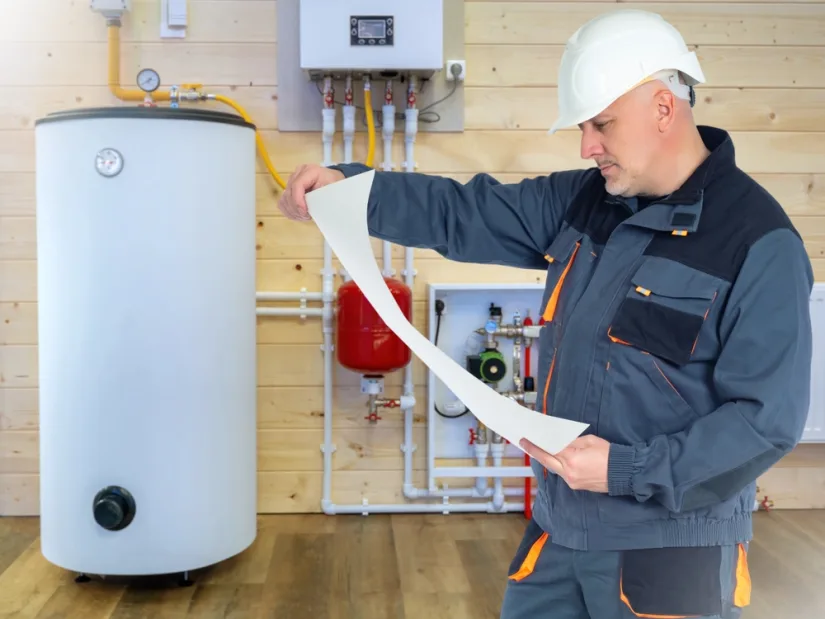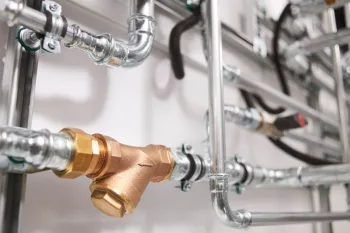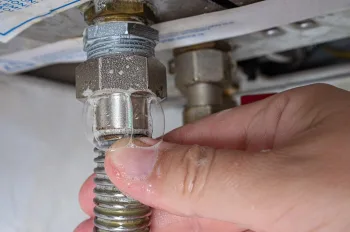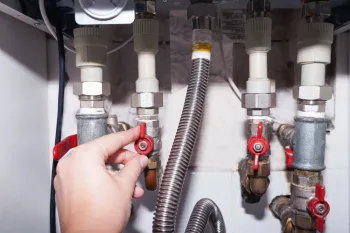
Gas line inspections are comprehensive examinations of the entire gas plumbing system, including pipes, valves, fixtures, pressure regulators, and connection points. The goal is to verify that the system is structurally sound, code-compliant, and safe for operation.
During the inspection, a gas plumbing expert will proactively identify leaks, corrosion, pressure imbalances, or other defects before they escalate into hazardous situations. While safety is at the forefront, inspections also enhance energy efficiency, reduce waste, and ensure system reliability.
Scheduling natural gas line inspections is essential for both safety and efficiency, especially when you have heating appliances checked alongside outdoor appliances. These inspections help ensure all ventilation passages remain clear and functional, reducing the risk of gas accumulation or carbon monoxide buildup.
As a business owner or property manager, it is your responsibility to prioritize the importance of proactive maintenance. By scheduling inspections consistently, you not only safeguard your property and personnel but also ensure all systems run reliably across seasons and use cases.
Signs that a Gas Line Inspection is Necessary
Unusual Smells (e.g., Rotten Eggs)
A persistent sulfuric or “rotten egg” odor is the most critical indicator of a gas leak. This smell is created by odorant additives such as mercaptan. Repeated detection, particularly near gas valves, stoves, water heaters, or transformers warrants immediate inspection.

Unexplained Increases in Gas Bills
A sudden or gradual rise in gas costs without corresponding usage could stem from slow leaks or malfunctions, including a faulty pilot light assembly in gas furnaces or inefficient burners in boilers. Regular inspection can trace and help contain hidden leaks.
Old or Outdated Gas Appliances
Appliances older than 15 years, such as stoves, furnaces, or water heaters may have deteriorating seals or obsolete safety features. Outdated gas pressure regulators, internal diaphragms, or connectors require inspection to ensure ongoing compliance and safe operation.
Regulatory Compliance and Inspections
Frequency of Inspections Per Local Regulations
Many jurisdictions mandate annual or biennial inspections for commercial gas equipment. Healthcare, hospitality, and educational facilities often face stricter codes. Additionally, alterations or ownership transfers typically require a fresh inspection certificate.
Potential Penalties for Non‑Compliance
Failure to observe regulatory inspection schedules can lead to fines, forced shutdowns, and voided insurance coverage. Utility companies may suspend service until deficiencies are corrected. Noncompliance also increases liability risks in the event of accidents.
Process of a Gas Line Inspection
What to Expect During an Inspection
- Scene Assessment: Inspectors verify access to all gas appliances, valves, and the meter area.
- Pressure and Leak Testing: Using manometers and ultrasonic detectors, the system is pressurized above operating levels (typically 2–5 psi) and monitored for pressure drops. Soapy water and electronic sniffers help locate micro-leaks.
- Regulator Examination: Regulators are tested for cut-in/-out pressures; diaphragm performance and pilot pressure are verified.
- Fitting and Joint Check: Every threaded or welded connection is checked for proper torque and seal integrity.
- Appliance Check: Verified flame characteristics, vent pathways, and combustion efficiency using combustion analyzers or CO sensors.
- Documentation: A comprehensive report details findings, test metrics, observed issues, and recommended repairs, accompanied by compliance certifications.
Common Issues Found During Inspections
- Micro‑leaks at fittings
- Corroded underground pipes
- Faulty regulators or diaphragms
- Clogged pilot orifices
- Vent blockage or negative ventilation
- Pressure loss due to loose unions or aging gaskets
Safety Tips for Maintaining Your Gas Line
Regular Maintenance Routines
- Schedule annual inspections by licensed professionals.
- Test carbon monoxide detectors monthly to catch incomplete combustion.
- Clean and test burner assemblies on boilers, furnaces, and stoves.
- Check for odors or a hissing sound, manually inspecting valves and joints.
- Confirm that emergency shut offs are accessible and labeled.
Emergency Protocols
- Immediately evacuate if gas odor is detected or if alarms activate.
- Shut off the gas supply (if you are trained and it is safe to do so).
- Call emergency services and your gas provider to report leaks.
- Once safe, schedule a detailed gas inspection and repair as well as installation of safety devices.
How Our Gas Plumbing Experts Can Help
Comprehensive Inspection Services
Coastal Commercial Services offers fully licensed, code-compliant inspections that are customized for commercial settings:
- Scheduled & recurring inspections—annual or quarterly visits with pressure decay tests, regulator calibration, burner assessments, and pilot checks.
- Ventilation and combustion diagnostics—using combustion analyzers to identify CO drift, inefficient burn, or vent-imposed downdrafts.
- Underground and concealed line surveys—including tracer gas testing and pipe integrity assessments for buried installations.
- Documentation—including word-for-word compliance logs, remediation recommendations, and certificate generation for utility or insurance review.

Customer-Centric Service Approach
- Personalized Inspection Plans: We analyze your site’s gas loads, appliance count, and system layout to create a tailored inspection schedule, avoiding unnecessary costs while ensuring comprehensive coverage.
- Transparent Findings and Clear Recommendations: Each visit includes a debrief summary of system health, identified issues, cost estimates for upgrades or replacements, and a projected inspection roadmap.
- Immediate and Permanent Repairs: Our qualified professionals carry commercial-grade regulators, high-pressure valves, and certified combustor kits to address detected failures on-site, minimizing downtime and liability.
- Proactive Safety Planning: We assist clients with custom SOPs for leak detection drills, evacuation procedures, pre-shutdown sequences, and re‑commissioning checklists to ensure regulatory alignment.
- Utility Partnership Coordination: We handle agency communication for pressure restoration, meter relighting, and service reinstatement, coordinating with gas companies to expedite compliance and certification.
- Fully Documented Service Records: All work, including repairs, regulator calibrations, and inspections, is logged in a digital asset management system, providing easy retrieval for audits or liability claims.
- State-of-the-Art Tools and Training: Our technicians employ diagnostic-grade manometers, gas detectors, combustion analyzers, and remote monitoring systems. We also engage in ongoing training on NFPA and local code updates.
- Value-Driven Preventive Contracts: We offer flexible inspection and service contracts that include routine visits, emergency priority access, and monitoring system maintenance, all packaged with transparent scopes and pricing.
- Emergency 24/7 Response: In case of suspected leaks, emergencies or other issues and concerns, our rapid-response teams are available around the clock, with prioritized scheduling and immediate containment capabilities.
Schedule Your Gas Line Inspection With Our Experienced Plumbers
Gas line inspections are an essential component of safe and efficient commercial property operation. Being proactive in identifying issues, whether through odor detection, periodic billing anomalies, or appliance age is more effective and cost-efficient than reacting to crises. Overlooking inspections may lead to regulatory penalties, financial losses, and safety liabilities.
Coastal Commercial Services, Inc. offers a complete spectrum of inspection, repair, and compliance services for gas lines backed by expertise, transparent communication, and real-time monitoring solutions. By partnering with us, you ensure a safer, more reliable gas infrastructure for your business, with peace of mind that comes from documented code compliance and professional support every step of the way.
To schedule your service, call us at (772) 248-0490 or contact us online.



